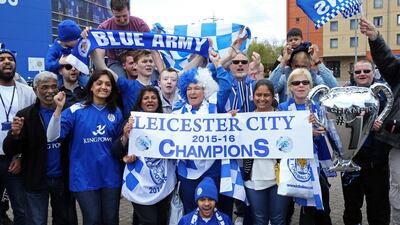Despite Leicester City, one of the poorest English Premier League (EPL) football clubs, astounding fans by winning the top title this week, EPL players scored a record £2 billion (Dh10.67bn) in wages last year as their teams netted the second highest-ever aggregate pre-tax profit, figures released on Wednesday show.
The top-flight teams also bagged a record in transfer fees approaching £1bn, said Deloitte, which compiled the data.
In doing so, they maintained the momentum they generated in the 2013/14 season "in impressive stye", said the business advisory firm.
For the first time since 1999, EPL clubs recorded a second consecutive year of aggregate pre-tax profits, generating approximately £120 million in 2014/15, according to Deloitte. This follows last year's record-breaking profit of £190m for the 2013/14 season.
The rude financial health of EPL teams led to record summer 2015 transfer spending of £870m.
Topping the list was Abu Dhabi-owned Manchester City's purchase of Kevin De Bruyne form Wolfsburg for £54m. City broke their own transfer record to bring in De Bruyne to add to their attack shortly after the club paid £49m to bring Raheem Sterling from Liverpool to the Etihad Stadium.
City's cross-town rivals Manchester United came in third with Anthony Martial, whom they bought from Monaco for £36m. That deal, which raised many an eyebrow at the team, made Martial the most expensive teenage footballer of all time. He has since more than silenced the naysayers. The Red Devils splashed out on the highly-rated Frenchman on deadline day.
In contrast, the costliest signing the newly crowned Premier League champions Leicester made in the summer window was the £7m the Foxes paid to bring the Japanese striker Shinji Okazaki to the King Power stadium from Mainz. Today, that looks to be the bargain of the season as his skills alongside those of fellow strikers Jamie Vardy, Leonardo Ulloa and midfielder Riyad Mahrez propelled the team, with odds of 5,000 to 1 to win the title at the start of the season, to what has widely been described as one of the greatest ever sporting achievements.
The title was made theirs after Spurs failed to win on Monday, meaning the Foxes' lead was unassailable with two matches still to play.
In addition to transfers and profits, the clubs last season recorded combined operating profits (which excludes player trading, net interest charges and the amortisation of player contracts) of more than £500m. Despite being lower than the operating profit achieved in the first year of the current broadcast rights deals in 2013/14, this is nevertheless the second-highest ever. Of the 20 clubs in the Premier League, 17 recorded an operating profit in 2014/15.
"The perennial problem for Premier League clubs was to convert revenue growth into profitability," said Dan Jones, a partner in the sports business group at Deloitte. "We saw this problem solved with record-breaking results last year. The new challenge was to sustain this financial success, and the Premier League clubs have accomplished this in impressive style in the latest results.
Mr Jones said the outlook for EPL teams appeared even brighter.
"With further significant revenue increases already guaranteed for the next broadcast cycle, starting in 2016/17, there is every reason to be confident of the Premier League clubs' profitability being here to stay."
Premier League clubs' wage costs rose by 6 per cent in 2014/15 to a total of £2bn, increasing the wages/revenue ratio to 60 per cent. Despite the increase in wage costs, the ratio is still the second-lowest in the Premier League in the past 10 years.
"Premier League clubs now enjoy a significant revenue advantage over all but a handful of the biggest clubs from elsewhere in Europe," said Adam Bull, a senior consultant in the sports business group at Deloitte.
"This has earned the Premier League clubs a huge and self-perpetuating advantage over continental peers in terms of attracting playing talent. The security of world leading revenues, now augmented with sustained profitability, aided by cost control measures in place for both domestic and European competitions, makes clubs playing in the Premier League, and those with aspirations to get there, particularly attractive to investors from around the globe."
In addition, humble Leicester, who this time last year were battling relegation to the English second tier Championship, will now be licking their chops at the prospect of taking on Europe's elite clubs in the Champions League next season.
The governing body Uefa awards €2m (Dh8.4m) to the play-offs winners and €3m to the eliminated clubs in the play-off round. For reaching the group stage, Uefa awards a base fee of €12m. A win in the groups is awarded with €1.5m and a draw is worth €500,000. In addition, Uefa pays teams reaching the first knockout round €5.5m, each quarter-finalist €6m, €7m for each semi-finalist, €10.5m for the runners-up and €15m for the winners.
Could the Foxes bag a €15m cheque next summer? As what happened this year shows, dreams can come true.
chnelson@thenational.ae
Follow The National's Business section on Twitter

English Premier League players’ wages hit £2bn as clubs build up financial momentum
Clubs in excellent financial health revealed with records smashed and future looks even brighter.
Most popular today
